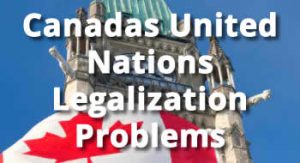Canadas United Nations Legalization Problems
Canadas United Nations legalization problems. Cannabis is a Schedule 1 drug as classified by the World Health Organization. This means Canada could face problems if it legalizes cannabis. Canadians elected Liberal Prime Minister Justin Trudeau on his promise to legalise pot. A report has come in about the practicalities of legalising cannabis before legislating later this year. But there are the obstacles of three international treaties that makes cannabis illegal. The Canadian government has not said how it will deal with these obstacles.
Canadas United Nations Legalization Problems
Schedule 1 drugs include LSD and ecstasy. World leaders believe these drugs are a serious health risk to the public. In an article in the Canadian Medical Journal, Steven J. Hoffman and Roojin Habibi, claim legalizing cannabis violates three international conventions:- 1961 Single Convention on Narcotic Drugs
- 1971 Convention on Psychotropic Substances
- 1988 Convention Against Illicit Traffic in Narcotic Drugs and Psychotropic Substances.

Ignore the issues and legalise cannabis
Although Canadians may not think it a big deal, breaking Canada’s word to the international community can bring all sorts of other ramifications. Professor Hoffman said you cannot just pick and choose which treaties to follow. This only encourages other countries to do the same. Signing up to international treaties gives Canada a real legal obligation. Professor Hoffman said the US had signed the same treaties. While the US has a federal ban on cannabis it is lenient on enforcing this on the states who have legalized it like Colorado and California.Ask for special treatment
Canada can ask other treaty signatories for an exception to allow it to legalize cannabis, moreover to agree to uphold other parts of the treaties. This is difficult in practice with dozens of countries signed up to the treaties. It is unlikely that other countries will give Canada special permission to legalise cannabis products.Revoking Canada’s support of the treaties
Professor Hoffman said the simplest way to solve the issues is for Canada to withdraw from the treaties. They have provisions for this in the treaties. He believes the treaties are so old they do not reflect current thinking. The latest one is at least 30 years old. He said Canada would be withdrawing from outdated treaties long overdue for revision. The problem with revising them is getting all signatory countries to agree on changes. Some countries still have the death penalty for convicted drug traffickers. A country can withdraw from the treaties by completing the following processes:- To withdraw from the 1961 and 1971 treaties notice must be given by July 1 this year for it to take effect by January 1, 2018. If notice is given after July 1, then it does not take effect until January 1, 2019.
- To leave the 1988 treaty, a country is eligible one year after the Secretary-General receives notification of intention to withdraw from the treaty.
Change the constitution – Canadas United Nations Legalization Problems
The final solution is changing Canada’s constitution. The treaties say that if a country’s constitution protects its peoples’ right to use a drug, then the Constitution overrides any treaties. For example, Bolivia has given its people the right to continue the ancient custom of chewing coca leaves in its constitution. So, Canada can put a clause in its constitution to protect its people’s rights to use cannabis.The Easy Solution
While this may be the easy solution. Changing the constitution is not as easy as it sounds. Many attempts to change the constitution have failed, though 11 amendments since 1982 of minor issues. Currently the government is examining the task force recommendations and its international commitments. To date, there is no solution coming from the government about how it will handle Canada’s international legal obligations. Canadas United Nations legalization problems may not resolve legally by July 1st 2018.Big Money Pushing This Forward
But there is big money pushing this forward. And that’s just how the West works. We’re talking about an estimate of over 40 billion dollars annually for just the recreational market in Canada. And keep in mind Canada is a large country, but it’s population is very small. With Canada’s population still under 36 Million people, we’re talking huge business. And when corporations get involved, there’s no stopping them. Legalized marijuana in Canada will happen, and only the corporations will earn the big bucks in the green rush. But how exactly the laws will play out are yet to be determined.Mr. BC Seeds
Mr. BC Seeds is an over educated old school hippy who has been involved in the cannabis industry since the 1970's. He is one of the most experienced marijuana breeders in Canada if not the entire world. He was the first to use the most advanced breeding techniques in 2008 to create 42 of the world's strongest cannabis strains. He has been writing in-depth articles about cannabis in Canada for decades and looks forward to continue bringing you cutting edge cannabis strains for the decades to come. Mr. BC Seeds uses a "pen name" because he still travels the world collecting cannabis strains and continues researching cannabis in laboratories of non-legalized countries.
Posted in General and tagged Canadas United Nations Legalization Problems

Leave a Comment